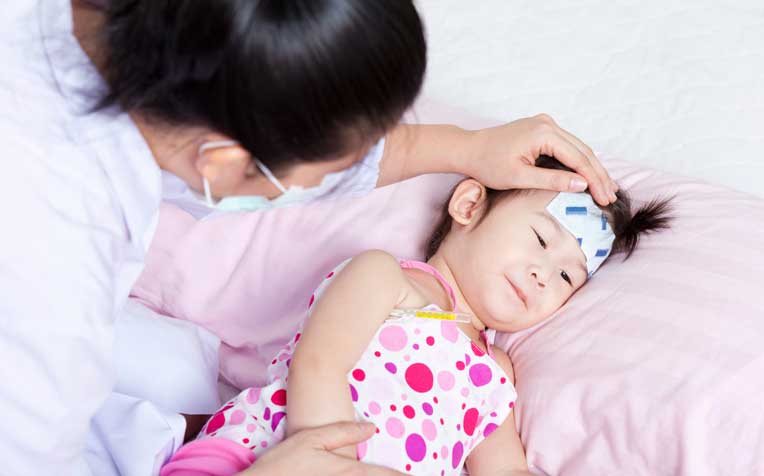HealthXchange will NEVER ask you to transfer money over a call. If in doubt, call the 24/7 ScamShield helpline at 1799, or visit the ScamShield website at www.scamshield.gov.sg.
Non-English translations are machine-generated; verify independently for
potential
inaccuracies.
Let us help you find what you're looking for.
Popular Searches
Children's Fever: When to See a Doctor

Fever in children should be medically treated if child is not eating properly.
Fever in children: Medical help
Fever Medications
Paracetamol
- First line of medication to be used, can be given every 4-6 hours
- Every 4 hours if temperature above 39 °C
- Every 6 hours if temperature less 39 °C
- Do not use in infants less than 3 months old
Ibuprofen
- Use only when fever is persistently above 39 °C, 1 - 2 hours after paracetamol
- Given every 6 hours
- Do not use in infants less than 1 year old, unless advised by your doctor
Diclofenac Na (Voltaren suppositories)
- Use only when fever is persistently above 39 °C, 1 - 2 hours after paracetamol
- Given every 12 hours
- Do not use in infants less than 1 year old, unless advised by your doctor
Do not give your child:
- Both ibuprofen and diclofenac at the same time as they belong to the same class of medications.
- Either ibuprofen or diclofenac if there is any severe vomiting or bleeding disorders, in view of possible bleeding from the stomach and intestines.
- An anti-pyretic usually brings down the temperature by 1 - 2 °C. Do not be alarmed if your child is still having a fever after the medication. Antibiotics are of no use in viral fevers.
- Do not use Aspirin in children.
Consult your doctor when your child:
- Is feeding poorly, vomiting or lethargic
- Is very young, especially less than 3 months old
- Has difficulty breathing
- Is drowsy
- Looks sicker than previously
- Has abdominal pain and discomfort
- Has rash
- Has decreased urine output
Useful telephone numbers
- Central Appointment - 6294 4050
Click on page 1 to read about some fever facts and what you can do at home to bring down fever in children.
Ref: V10
Contributed by
Related Articles
Public Events
19 Feb 2026
Talks
Health Talk: Fall Prevention @ SHP-Eunos
Free, no registration required. Please walk in to clinic at specified date and time.
Learn More
24 Feb 2026
Talks
Health Talk: Chronic Kidney Disease @ SHP-Outram
Free, no registration required. Please walk in to clinic at specified date and time.
Learn More
24 Feb 2026
Talks
Health Talk: Fall Prevention @ SHP-Tampines
Free, no registration required. Please walk in to clinic at specified date and time.
Learn More
24 Feb 2026
Talks
Health Talk: Fall Prevention @ SHP-Tampines North
Free, no registration required. Please walk in to clinic at specified date and time.
Learn More
Get the Health Buddy App
© 2025 SingHealth Group. All Rights Reserved.















 Get it on Google Play
Get it on Google Play